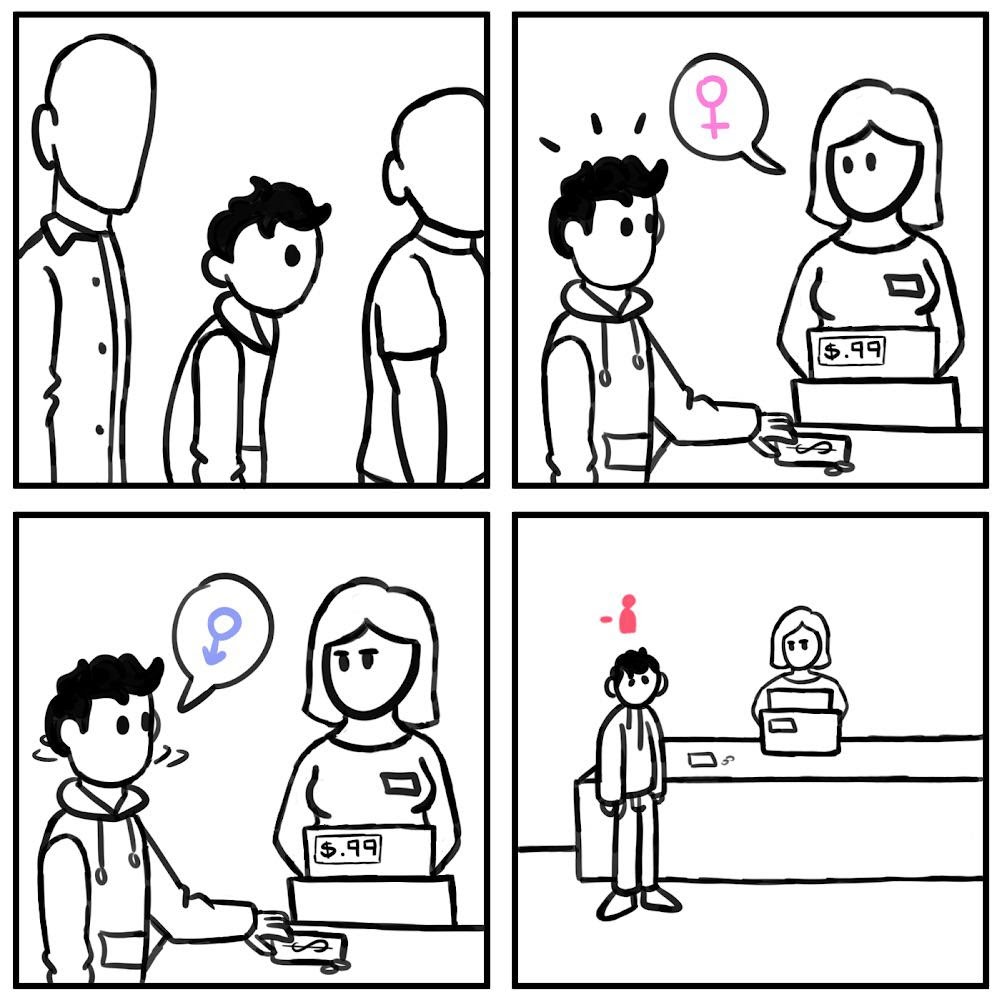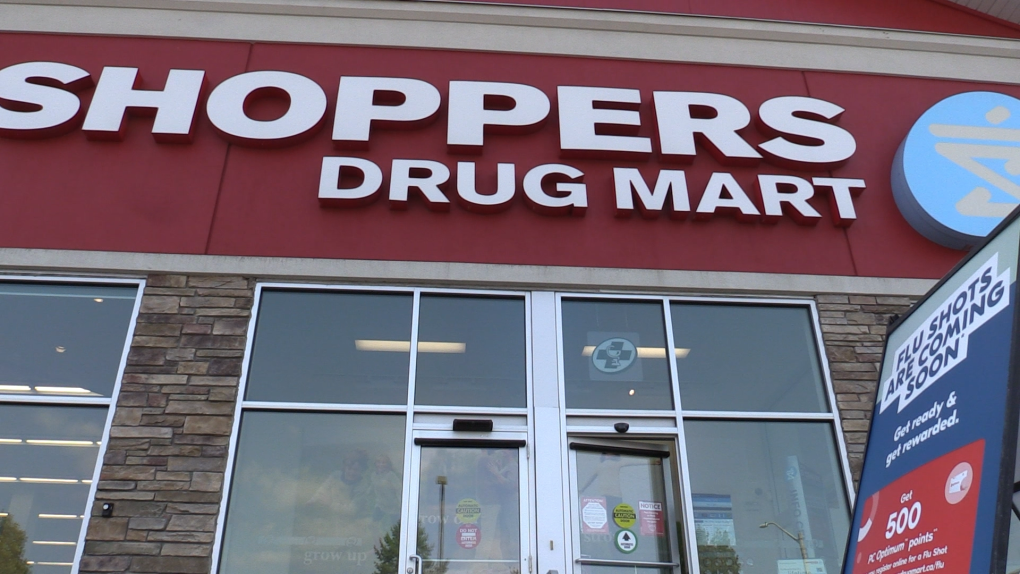You’d think that Shopper’s Drug Mart, that self defines as “Canada’s leading pharmacy retailer,” would have inclusive customer service practices towards the Two Spirit and LGBTQIA clients. Shopper’s Drug Mart has made efforts to support the 2SLGBTQIA community, like sponsoring Toronto Pflag in 2022 and was a grand prize partner for Canada’s Drag Race. So it stands to reason that Shoppers would provide drugs and pharmacological care to the trans community.

Shopper’s also collaborated with Bell Media in creating custom branded content featuring drag queens sharing tips for “everyday makeup routines and launched a “Pride-inspired beauty collection” under the Quo Beauty brand. The fabulous cosmetics department also draws people of all genders, and it would be wise business practice to have employees trained in dealing with these important customers.
Unfortunately, my experience of multiple misgenderings and cisgender privileged responses to these incidents shows that Shopper’s Drug Mart does train nor uphold a standard of practice in local stores to welcome the queer community despite their performative commercial support (except for having a rainbow flag sticker in their doorway).
(Note: I am grateful for the information about Shopper’s Drug Mart’s public support of TGM folx provided by Conlin Delbaere-Sawchuk and David Shellnut)

On February 20th, 2023, I went to Shoppers to get some things and interacted with several staff members there. When I bought my articles, I realized I did not have a bag, and I asked if I could leave my articles and get one from my car. The cashier said it was not a problem, but then she turned to another employee and said, “She’s just going out to her car to get a bag.” I called out to them as I was exiting, “I am not a she.” I saw the new employee looking perplexedly at me as if I spoke in another language to them. When I returned with the bags, I realized there was an issue with being overcharged for an item.
I knew I was in trouble here because, in my experience, Shopper’s Drug Mart employees get really angry with questions and also feel the need to discuss the issue with other staff, thereby using the third person. This is dangerous territory for me since cisgender people can complain in comfort and not be discussed over and misgendered, and I cannot. I was hoping one correction of the initial misgendering would be enough. Of course, sigh, it was not.

So, after dealing with the price issue, I told the employee that my pronouns were not she, I had been misgendered, and I went by he. The employee looked at me and did not apologize or correct the mistake but said, “How am I supposed to know? You have to tell me.” I said, if you don’t know, you should ask, or you shouldn’t assume people’s gender and use “they .”The employee reacted wide-eyed as if I asked her to use the f-word, exclaiming loudly, “I can’t use they!” (what’s the matter with they, I wonder, why doe this employee think using they pronouns is wrong, but using the incorrect cisgender norming pronouns is ok?).

I stated that I felt she needed training, and I wanted her name and the manager’s contact information. Throughout, I maintained a pretty neutral tone, but as I was leaving, this employee came out from behind the cash and stood in front of me, blocking my exit, saying, “I bet you feel really good right now about complaining.” I was completely surprised by this behaviour, showing an utter lack of awareness of the harm misgendering does. I told her I did not feel good; I felt dysphoria about being misgendered. The employee responded I need to know before I complained that it was not her intent to do that to which I answered that I knew it was not her intent, it was a common microaggression against queer people to misgender, and the burden should not be placed on customers to explain their genders or worry about employees feelings when being misgendered by them. The employees did not understand what I was saying, being so steeped in cisgender privilege as to render it invisible and to render me inaudible. I started walking out, saying that I felt she needed some training.

Office of Equity, Diversity, and Inclusion, #EDI365
I was so upset by this encounter I sat in my car and wrote it down. I may not have remembered everything said; however, this is a pretty accurate account.
This is not the first time I walked into Shopper’s Drug Mart looking for essentials and walked out with what was essentially a bagfull of transphobic cisgender norming. That just is not my bag! I wish I had the privilege of shopping in peace like the other cisgender shoppers at Shopper’s Drug Mart.
Misgendering trans, queer and gender minority customers does cause psychological harm in the form of minority stress trauma. Misgendering is a particularly insidious way that trans and gender minority (TGM) persons are traumatized because, on the one hand, it lets us know the larger system of cisgenderism is at play and on the other, it invalidates our identities, causing anxiety, depression and dysphoria (Shipherd et al., 2019).
Gender-privileged people, like this employee, often unwittingly commit microaggressions because of their unexamined adherence to the male-female-only gender binary and their presumptions that they should be able to read a person’s gender and classify them on sight.
Microaggressions are “brief and commonplace daily verbal, behavioural, or environmental indignities, whether intentional or unintentional, that communicate hostile, derogatory, or negative slights and insults toward members of oppressed groups” (Nadal, 2013, p. 36). Misgendering, like what happened to me tonight, is a common microaggression of cisgender privileged people. When you correct misgendering, many have the nerve to further the microaggression by not apologizing, correcting and moving on, but refusing to acknowledge the harm caused and rendering their actions invisible by shifting focus to the complainer. Unlike TGM folx, cisgender privileged people are shielded in an environment that protects them from gender identity-based stress and microaggressions.
In the case above, the employee actually managed to show cisgender fragility, which is the stress and defensive behaviour cisgender people feel, exhibit and respond with when confronted with any gender identity-based discomfort (Oaster, 2019).
Unacknowledged cisgender privilege, the ability to respond with microaggressions and act out of cisgender fragility, require some training and awareness if you want to welcome trans and gender minorities into your business. Also, following the Ontario human rights code, trans people like myself should be able to shop in the same way that cisgender people do. Using binary genders only as part of customer service ensures that cisgender people will be respected and not trans and gender minorities. Again, this is discrimination. I would hope that Shopper’s Drug Mart would seriously look at how they are welcoming TGM and queer people and make sure they have the same shopping experience and respectful customer service as cis folks do.
Nadal, K. L. (2013). That’s so gay! Microaggressions and the lesbian, gay, bisexual, and transgender community. American Psychological Association. https://doi.org/10.1037/14093-000
Oaster, Zachariah Graydon, “Cisgender Fragility” (2019). Masters Theses. 4729.
https://scholarworks.wmich.edu/masters_theses/4729
Shipherd, J. C., Berke, D., & Livingston, N. A. (2019). Trauma recovery in the transgender and gender diverse community: extensions of the minority stress model for treatment planning. Cognitive and Behavioral Practice, 26(4), 629-646.

Thank you for sharing your experience, Key – I completely agree that service needs to be aligned with marketing. Your sources are super useful!